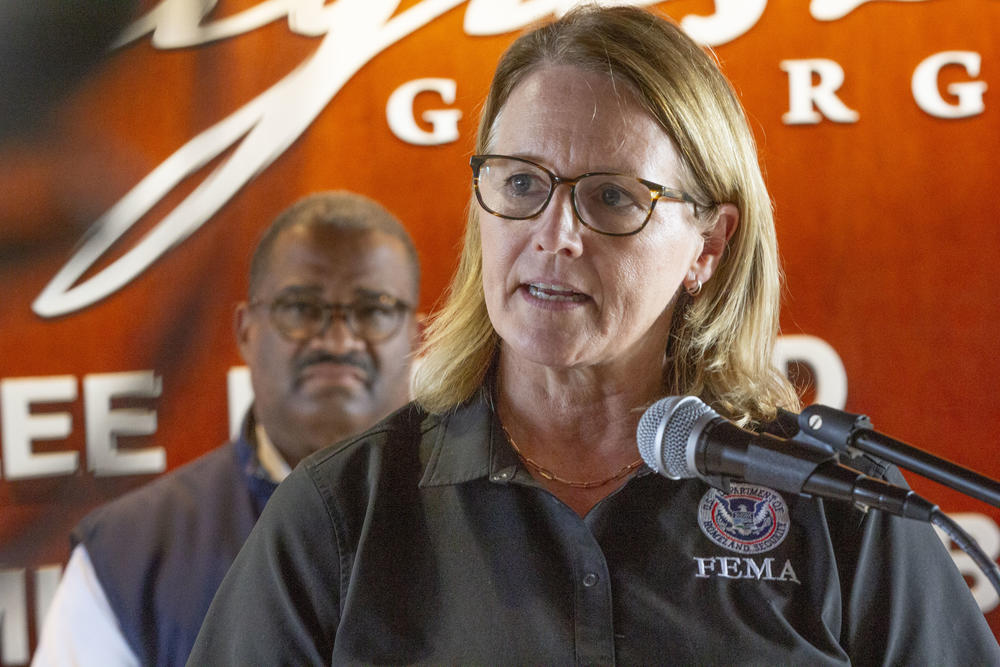
Caption
FEMA Administrator Deanne Criswell speaks in Augusta after a briefing with Mayor Garnett Johnson and other city leaders on Oct. 23, 2024.
Credit: Sofi Gratas/GPB News
|Updated: October 25, 2024 12:21 PM
LISTEN: Nearly a month after Hurricane Helene ripped through southern and eastern Georgia, the Federal Emergency Management Agency says they have distributed some $159 million in disaster assistance to hundreds of thousands of people. GPB's Sofi Gratas reports.

FEMA Administrator Deanne Criswell speaks in Augusta after a briefing with Mayor Garnett Johnson and other city leaders on Oct. 23, 2024.
Nearly a month after Hurricane Helene ripped through southern and eastern Georgia, the Federal Emergency Management Agency said it has distributed some $159 million in disaster assistance to hundreds of thousands of people.
According to FEMA, that looks like over 330,000 assistance applications in Georgia so far.
In Augusta, recovery from Helene is far from over. In some areas the internet hasn’t been totally restored, debris-covered roadways are still being cleared and many damaged houses remain covered in blue tarp.
At a press conference Wednesday, FEMA administrator Deanne Criswell said she knows what’s been distributed is only the beginning of what’s needed.
“We are here for the long haul,” Criswell said. “We see these tragic incidents, but as I mentioned to the mayor, we also have an opportunity to build back stronger and build back more resilient as well.”
Criswell’s remarks came after a meeting with county administrator Tameka Allen, county Fire Chief Antonio Burden and Augusta-Richmond County Mayor Garnett Johnson, who provided updates to ongoing recovery efforts on the ground.
“The priority remains clearing roadways … with a focus on main corridors,” Johnson said. “We continue to ask you to please be patient.”
Crews have so far picked up over 400,000 cubic yards of leftover matter from Helene’s path — equivalent to over 50,000 commercial-sized dumpsters — more than any prior storm the city’s experienced, Johnson said.
Traffic signals and utility systems such as water are back to normal functions, though the city is encouraging residents to report leaks.
Over 60,000 people in Augusta have applied for FEMA assistance. Criswell said FEMA hopes to open a total of 20 disaster recovery centers in Georgia towns across Helene’s path where those affected can apply for recovery assistance. FEMA will continue operating mobile response units that can meet people face to face in areas further from the Disaster Recovery Centers, of which there are nine.
The first form of assistance available to people is $750, said FEMA's Deanne Swain.
“It's an initial payment that people can use for emergency supplies like food, water, baby formula and other storm related expenses,” Swain said.
People do not have to pay that money back, contrary to misinformation that swirled on social media following the storm.
Criswell said on Wednesday that damage inspections need to happen before even those initial applications for emergency aid are processed, and that people waiting should visit a Disaster Recovery Center for updates on their claim.
Those who apply to FEMA online or in-person at Disaster Recovery Centers may be eligible for additional financial support, including business loans and disaster unemployment. All disaster recovery centers are open seven days a week, with no current plans to close and upcoming deadlines for assistance applications are in November and December.
Christie Moore runs the Valdosta-Lowndes Chamber of commerce. The South Georgia city was heavily damaged by Hurricane Helene. Moore said many local businesses, while open, are functioning with “hidden” damage, like downed point of sale systems.
Moore said while she recognizes there’s lots of money coming from the federal government for recovery, it’s not all within reach, especially in the case of loans from the Small Business Administration.
“Many of our businesses already had a COVID economic injury loan — many of them also have a loan from Hurricane Idalia,” Moore said. “So many of them aren't necessarily going to try to take another loan because the debt ratio is too high.”
Moore said she's hopeful for an intervention in the form of congressional appropriations and is in the process of engaging with state leaders.
“It's been a tough couple of years around here,” Moore said. “Sometimes we do feel a little forgotten.”